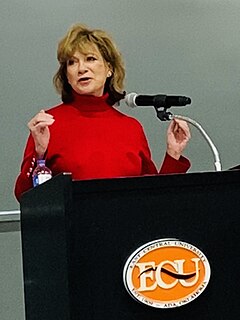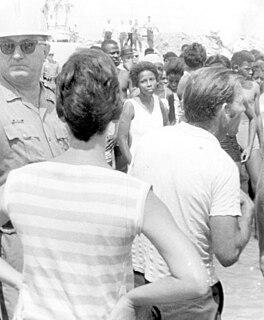A hate crime is a prejudice-motivated crime which occurs when a perpetrator targets a victim because of their membership of a certain social group or racial demographic.

Oklahoma is a state in the South Central region of the United States, bordered by Texas on the south and west, Kansas on the north, Missouri on the northeast, Arkansas on the east, New Mexico on the west, and Colorado on the northwest. Partially in the western extreme of the Upland South, it is the 20th-most extensive and the 28th-most populous of the 50 United States. Its residents are known as Oklahomans, and its capital and largest city is Oklahoma City.
Mass racial violence in the United States, includes Ethnic conflict and race riots, can include such events as:

The Tulsa race massacre took place on May 31 and June 1 in 1921, when mobs of White residents, some of whom had been appointed as deputies and armed by city officials, attacked Black residents and destroyed homes and businesses of the Greenwood District in Tulsa, Oklahoma. Alternatively known as the Tulsa race riot, the event is considered one of "the single worst incident[s] of racial violence in American history" and has been described as one of the deadliest terrorist attacks in the history of the United States. The attackers burned and destroyed more than 35 square blocks of the neighborhood – at the time one of the wealthiest African-American communities in the United States, colloquially known as "Black Wall Street."

Tulsa is the second-largest city in the state of Oklahoma and 47th-most populous city in the United States. The population was 413,066 as of the 2020 census. It is the principal municipality of the Tulsa Metropolitan Area, a region with 1,015,331 residents. The city serves as the county seat of Tulsa County, the most densely populated county in Oklahoma, with urban development extending into Osage, Rogers, and Wagoner counties.
Greenwood is a historic freedom colony in Tulsa, Oklahoma. As one of the most prominent concentrations of African-American businesses in the United States during the early 20th century, it was popularly known as America's "Black Wall Street". It was burned to the ground in the Tulsa race massacre of 1921, in which a local white mob gathered and attacked the area. Between 75 and 300 Americans were killed, hundreds more were injured, and the homes of 5000 were destroyed, leaving them homeless. The massacre was one of the largest in the history of U.S. race relations, destroying the once-thriving Greenwood community.

Lynching in the United States was the widespread occurrence of extrajudicial killings which began in the pre–Civil War South in the 1830s and ended during the civil rights movement in the 1950s and 1960s. Although the victims of lynchings were members of various ethnicities, after roughly 4 million enslaved African Americans were emancipated, they became the primary targets of white Southerners. Lynchings in the U.S. reached their height from the 1890s to the 1920s, and they primarily victimised ethnic minorities. Most of the lynchings occurred in the American South because the majority of African Americans lived there, but racially motivated lynchings also occurred in the Midwest and border states.

Rilla Askew is an American novelist and short story writer who was born in Poteau, in the Sans Bois Mountains of southeastern Oklahoma, and grew up in the town of Bartlesville, Oklahoma.

Charles James Ogletree Jr. is an American attorney, law professor and the Jesse Climenko Professor at Harvard Law School, the founder of the school's Charles Hamilton Houston Institute for Race and Justice. He is also the author of books on legal topics.
This is a list of topics related to racism:
Riots often occur in reaction to a perceived grievance or out of dissent. Riots may be the outcome of a sporting event, although many riots have occurred due to poor working or living conditions, government oppression, conflicts between races or religions.

The Tulsa Police Department (TPD) is the principal law enforcement agency for the city of Tulsa, Oklahoma, United States. It is nationally accredited by the Commission on Accreditation for Law Enforcement Agencies It is the second largest municipal law enforcement agency in Oklahoma.

James Paul Lankford is an American politician serving as the junior United States senator for Oklahoma since 2015. A member of the Republican Party, he previously served as the U.S. representative for Oklahoma's 5th congressional district from 2011 to 2015.
This Land Press is a media and merchandising company based in Tulsa, Oklahoma, that produces and sells Oklahoma-themed apparel and gifts, produces a quarterly print magazine, publishes books, and operates a retail store. It was founded by Michael Mason, an Oklahoma-born author, journalist, and editor. In March 2011, Tulsa businessman Vincent LoVoi partnered with Mason and became the publisher of This Land Press.

Racism in Canada traces both historical and contemporary racist community attitudes, as well as governmental negligence and political non-compliance with United Nations human rights standards and incidents in Canada. Contemporary Canada is the product of indigenous First Nations combined with multiple waves of immigration, predominantly from Europe and in contemporary times, from Asia.

Racism in the United Kingdom - negative attitudes and views on race or ethnicity held by various people and groups in the United Kingdom. The extent and the targets of racist attitudes in the United Kingdom have varied over time. It has resulted in cases of discrimination, riots and racially motivated murders. Racism was mitigated by the attitudes and norms of the British class system during the 19th century, in which race mattered less than social distinction: a black African tribal chief was unquestionably superior to a white English costermonger. Use of the word "racism" became more widespread after 1936, although the term "race hatred" was used in the late 1920s by sociologist Frederick Hertz. Laws were passed in the 1960s that specifically prohibited racial segregation.

Bavand Karim is an Iranian-American multi-media artist and filmmaker from Dallas, Texas.
Rachel V. Lyon is an American film director and producer.

In the context of racism in the United States, racism against Black Americans dates back to the colonial era, and it continues to be a persistent issue in American society in the 21st century.











